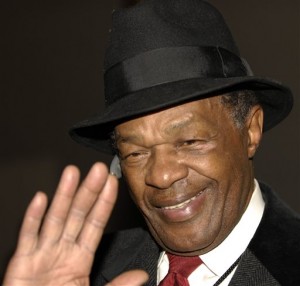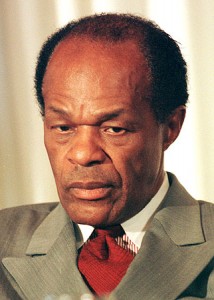Mr. Barry, who also served on the D.C. Council for 15 years and had been president of the city’s old Board of Education, was the most influential and savvy local politician of his generation. He dominated the city’s political landscape in the final quarter of the 20th century. There was a time when his critics, in sarcasm but not entirely in jest, called him “Mayor for Life.” Into the first dozen years of the new millennium, he remained a highly visible player on the city’s political stage, but by then on the periphery, no longer at the center.
His personal and public life was fraught with high drama and irony. He struggled with alcohol and drug addiction, relapse and recovery. He was married four times, divorced three times and separated from his fourth wife. His extramarital liaisons and legal trouble over unpaid taxes made news.
His programs helped provide summer jobs for youths, home-buying assistance for the working-class and food for senior citizens. And he placed African Americans in thousands of middle- and upper-level management positions in the city government that in previous generations had been reserved for whites.
“He was really the architect of creating a local government infrastructure in the early days of home rule,” Frederick D. Cooke Jr., a longtime friend who served as Barry’s attorney, said in a 2014 interview. “He helped it to diversify to be more inclusive. It had been a stilted, segregated entity, and he made it possible for people to believe they could have a seat at the table.”
Gladys Mack, assistant city administrator for budget in the first and subsequent Barry administrations, was among the mayor’s early managerial appointments appointees. Decades later, she would remember Mr. Barry as “a forward thinker.”
One example, Mack said, was his decision to build the new District Government building at 14th and U streets in Northwest Washington — a spawning ground for the 1968 riots that followed the assassination of the Rev. Martin Luther King Jr.
His advisers counseled against it, Mack recalled, but the mayor said, “We need to do this . . . and it became a catalyst for development of the entire area.”
Mack was named chief of the D.C. budget in 1979, a time when few women in the nation were in top municipal leadership jobs. Mr. Barry, she said, “appointed close to a dozen women to positions that were not traditional for women.”
When Mr. Barry took office, so chaotic had the District’s finances been that the city didn’t even know how much money it had in the bank. He instituted budgetary and fiscal accounting procedures to figure that out. But by the end of his last term as mayor, Congress and the courts had stripped him of much of his authority, complaining of graft, corruption and gross mismanagement in his administration.
“Some governments are corrupt but are known for their competency in running the city,” Sen. John C. Danforth (R-Mo.) told Mr. Barry at a 1989 hearing on the D.C. budget. “Others are incompetent but considered clean. [Washington’s] government is scandalously corrupt and hopelessly incompetent.”
In 1990, Mr. Barry was arrested on drug charges in a sting by the FBI and D.C. police after having been lured to a Washington hotel room by a woman with whom he’d previously had an amorous relationship. “Bitch set me up!” he muttered aloud as he was being placed under arrest. The comment was captured on FBI videotapes of the sting and broadcast on television, and it would endure as a signature phrase in Mr. Barry’s vocal legacy. His conviction months later would become front-page news around the world.
He completed a drug and alcohol rehabilitation program and served six months in a federal prison, then used the experience to his political advantage as a platform in his improbable comeback bid for elected office.
“Who can better help our city recover than someone who himself has gone through recovery?” he asked rhetorically.
Charismatic, irrepressible and engaging, Mr. Barry always seemed to get up again. In 1977, while on the council, he was shot during the siege of the District Building (now the John A. Wilson Building) by Hanafi Muslims, who also had taken over the Islamic Center and B’nai B’rith offices.
Mr. Barry’s wound was superficial, but it nevertheless enhanced his personal mystique. After a brief hospitalization, he returned to the political arena and in less than two years was mayor of the District.
For 16 of the next 20 years, he would hold that office. Over time, he would come to reflect a personal style that was almost regal.
In a chauffeur-driven Lincoln Town Car, he traveled across the city, accompanied by a select security detail of police officers and an entourage of aides and hangers-on. Attractive women were omnipresent. He delighted in such extravaganzas as his annual “State of the District address” at the Washington Convention Center, where city workers, senior citizens and schoolchildren were rounded up for a Marion Barry spectacle.
When the Washington Redskins went to the Super Bowl, Mr. Barry went, too, as the First Fan of the hometown team. After Washington beat Miami in the 1983 Super Bowl, he flew back to Washington on the team’s charter aircraft, which was met at Washington Dulles International Airport by President Ronald Reagan. First off the plane to be greeted by the president: Marion Barry.
He was a regular at title prizefights in Las Vegas and elsewhere, he vacationed in the Caribbean and he met with heads of state in Africa.
His constituents, he said, liked and expected this lifestyle. “We’re an example of pride to D.C., to the nation and especially to the international community,” Herbert O. Reid Sr., Mr. Barry’s longtime counsel, mentor and friend, said in 1979. Reid died in 1991.
In large measure, Reid told The Post in 1987, Mr. Barry’s political ambition and success stemmed from the wounds of a dirt-poor childhood and his need to overcome the feelings of rejection he experienced early in life.
“He really wants to be loved and liked by everybody,” Reid had said. “He is proud of his achievements. . . . But I think the background and struggle have left some scars. I think there is some concern about being accepted.”
As he ascended the stairway of power and prestige, the mayor promised never to forget the folks who put him in office. He could “walk with kings” and not “lose the common touch,” Mr. Barry often said, quoting from the poem “If” by Rudyard Kipling.
He cherished his reputation as a champion of the young, the aged and the poor, having plowed hundreds of millions of tax dollars into job training and employment programs, senior centers and social-welfare endeavors. Rank-and-file workers were hired by the thousands to serve under Mr. Barry’s newly-appointed supervisory corps of African American middle and top level managers.
“He was so in tune with the common person that he could make you feel as if you’d had a long term relationship, even if you’d only just met him for five minutes,” said his attorney, Cooke.
And Mr. Barry’s constituency, Cooke said, was not limited to the dispossessed. He promoted local African American businesses, “using government as an economic level to increase participation.”
Mr. Barry’s enemies saw it differently.
“Patronage, in the guise of local ‘empowerment,’ has always been hallmark of Barry’s governing philosophy,” wrote former FBI agent and Washington lawyer Carl T. Rowan Jr. in a 1998 New Republic article. To the mayor, Rowan said, the D.C. bureaucracy was “a source of jobs for people whose main qualification was their eligibility to vote for Barry.”
Before leaving office in 1999, Mr. Barry would lose his power over the city’s finances to a financial control board that Congress created in 1995. Courts would take over entire city departments.
The city agencies that served public-housing residents, foster children, inmates and the mentally ill would all be placed in receivership. A judge would later call conditions at the city’s receiving home for juvenile delinquents “unacceptable for a civilized country.”
Residents of a city-operated nursing home had limbs amputated because of infected bedsores. Infant mortality and murder rates remained among the highest in the nation, and the Fire Department would plead that its ability to fight fires was seriously impaired. In the public schools, dropout rates remained high, test scores low.
Mr. Barry left the mayor’s office insisting that the city was better off than it was when he was first elected. “I’ve had . . . more homers, more doubles, more triples than I’ve had strikeouts.”
In the turbulence of the 1960s, Mr. Barry had made his mark in the national capital: a young civil rights activist, streetwise and confrontational, with an “in-your-face” style that won the hearts and minds of thousands in the most depressed and impoverished of Washington’s black neighborhoods. Over the years, their support would remain unshakable, even in the face of such crises as the conviction of high Barry administration staffers on charges involving political corruption, a soaring D.C. murder rate, deteriorating municipal services and Mr. Barry’s own incarceration.
Voters in the city’s white and more-affluent neighborhoods were less forgiving. By 1994, when Mr. Barry made his last run for mayor, he was soundly repudiated in these areas, but this was more than offset by his strength in such poverty-stricken neighborhoods as Shaw, in the inner city, and Far Southeast Washington, east of the Anacostia River.
For those who harbored resentment that he could still be elected mayor of Washington after a drug conviction and jail sentence, Mr. Barry had this advice: “Get over it!”
In January 1979, Mr. Barry took the oath of office for the first time as mayor of the District of Columbia, having defeated the city’s first elected mayor, incumbent Walter E. Washington, and D.C. Council Chairman Sterling Tucker in the Democratic primary the previous September.
Mr. Barry ran strongly among white voters west of Rock Creek Park and on Capitol Hill, less so in poor, black areas — just the reverse of what would happen in the years ahead.
In a ceremony rife with symbolism, he was sworn in by U.S. Supreme Court Justice Thurgood Marshall, the first African American to serve on the high court, and Mr. Barry led an inaugural parade down the 14th Street corridor hit by rioting after the 1968 assassination of the Rev. Martin Luther King Jr.
His election coincided with a wave of African American political activism that swept black politicians into the mayor’s office in such cities as Detroit, Philadelphia, Chicago, Los Angeles, Newark, New Orleans and Atlanta, as well as Birmingham, Ala., Gary, Ind., and more than 200 smaller cities in the years between 1965 and 1985.
Marion Barry Jr. was born March 6, 1936, into a family of sharecroppers in the rural hamlet of Itta Bena, Miss. His mother, Mattie Carr, was just shy of her 17th birthday when she married Marion Barry Sr., a strapping sharecropper about 25 years her senior. The marriage disintegrated in conflicts over money and her ambition to flee a life of chopping cotton.
After leaving her husband, she settled in Memphis, where she worked in a slaughterhouse and as a housemaid.Growing up, the future mayor worked hard at a variety of jobs. He had two newspaper routes and sold a third newspaper on street corners. He waited tables, bagged groceries and inspected soda bottles. He also went to choir practice.
In school, he was a good student. He was also an Eagle Scout.
The work ethic would remain throughout his career. In the early 1970s, when Mr. Barry was on the school board, it was said of him, “While you are sleeping at night, Marion Barry is up planning his next move.” Later, there was another axiom: “The mayor will spend more time cultivating his enemies than his friends.”
In 1958, Mr. Barry graduated with a degree in chemistry from LeMoyne College in Memphis, where he had been president of the student chapter of the NAACP. It was during those years that college fraternity brothers gave him the middle name Shepilov, after Dimitri Shepilov, a purged member of the Soviet Communist Party. Occasionally, he was called “Shep,” but he never officially made it part of his name.
In 1960, he received a master’s degree in chemistry at Fisk University in Nashville. He helped organize an NAACP chapter at Fisk and was a leader of Nashville’s first lunch counter sit-ins. He also participated in a 1960 meeting of black college student leaders that led to the founding of the Student Nonviolent Coordinating Committee, a civil rights organization known for demonstrations, sit-ins and boycotts. Mr. Barry was its first national chairman.
At the University of Tennessee at Knoxville, where he was working on a doctorate, he met Blantie Evans, who would become his first wife. They were married in 1962 and later divorced.
In 1965, Mr. Barry arrived in Washington to direct activities for the SNCC. This came at a critical juncture in D.C. race relations.
Nationally, the civil rights movement was heating up. There had been riots in the black enclaves of several urban centers, and more were to come. In Washington, the post-World War II flight of whites to the suburbs had given the city a population that was majority African American. But the local government was dominated by whites and subject to the oversight of white-dominated congressional committees. There was no home rule.
The stage was set for Mr. Barry’s D.C. political debut. Clad in a dashiki shirt and speaking in inflammatory rhetoric, he established himself as a visible presence with a forceful voice that could not easily be ignored.
In January 1966, he led a one-day bus “mancott” to protest a fare increase requested by D.C. Transit. He organized a “Free D.C. Movement” to press for home rule. He called the D.C. Police “an occupation army.” In 1969, he tore up a parking ticket, struck the officer who had placed it on his windshield and was charged with assault. The case ended with a hung jury.
Rep. John L. McMillan (D-S.C.), the chairman of the House Committee on the District of Columbia and one of the most influential men in Washington, was among the targets of his rhetoric. “The citizens of the District of Columbia,” Mr. Barry declared, “are tired of living on the McMillan plantation.”
In the winter of 1967, Mr. Barry resigned as director of SNCC’s Washington office, declaring, “Now we must concentrate on control — economic and political power.”
With financial support from the Department of Labor, he organized and directed an organization known as Pride, which put more than 1,000 inner-city youths to work clearing alleys of trash and debris, killing rats — and later running gas stations and a landscaping business and managing an apartment building.
In 1971, Mr. Barry won his first election for citywide office, defeating School Board chair Anita F. Allen for an at-large seat on the board.
From 1972 until 1974, Mr. Barry was the school board’s chairman. In 1974, he was elected to an at-large seat on the D.C. Council, receiving more votes than any of the four other at-large council members. At that point, he resigned as director of Pride Inc. to become a full-time politician.
He turned over the management of Pride to his second wife, Mary Treadwell, a Pride colleague whom he met at Fisk. They would later divorce. Treadwell, who died in 2012, was convicted of conspiracy to defraud in connection with the theft of federal money from an apartment building managed by Pride, and she received a three-year jail sentence. Mr. Barry was not implicated in that case.
On the D.C. Council in 1975, he was instrumental in defeating a 1 percent gross-receipts tax on all city businesses, winning the gratitude of the business community. He helped get a pay raise for the police department. He was among the early supporters of equal rights for gays and lesbians. Voters in these constituancies supported Barry at the polls. When he ran for a second term in 1976, he was overwhelmingly reelected with 78 percent of the vote.
Two years later, he ran for mayor.
But this was a different Marion Barry from the militant, confrontational street activist of the 1960s. Gone were the dashiki and the threatening scowl. The Barry of 1978 wore business suits and smiled pleasantly, bending his powerful frame forward ever so slightly to hear the complaints and observations of the little old ladies whose votes he sought.
“I’m a situationist,” he said at the time. “I do what is necessary for the situation. If I walked around in a dashiki now, people would say I’m crazy.” This was a tactic he’d learned years earlier as a civil rights worker with the Student Nonviolent Coordinating Committee: It had been an SNCC principle that in the country, you dressed like country folks, and in the city, you dressed like city folks. That way, you could fit in.
In his first mayoral candidacy, Mr. Barry won the backing of Washington’s police, firefighters’ and teachers’ unions, and his cultivation of various interest groups across the city paid dividends at the polls. He also won an endorsement from the editorial board of The Washington Post.
In this first campaign, he ran as an outsider, inveighing against a city bureaucracy that he repeatedly described as “bumbling and bungling.” He outlined a “hit list” of department heads — many of them black — whom he said he would fire, and he lambasted real estate speculation, which he said was displacing elderly blacks from their homes.
“What Mr. Barry seems to value, and to be offering . . . is precisely what we think the people of this city need and ought to be looking for . . . energy, nerve, initiative, toughness of mind, and active concern for people in distress,” The Post said in an editorial.
With about 35 percent of the vote and a margin of less than 2,000, Mr. Barry won the Democratic primary that September. Not because of his appeal in the low-income black community, but because he carried the white wards of the city while his two chief opponents — former mayor Walter E. Washington and Tucker, the former council chairman — split the black vote. It was only after taking office that Mr. Barry consolidated a black base of support, not just among the poor and downtrodden but within the middle-class black and business community.
In November’s general election, he had no trouble defeating Arthur A. Fletcher, a Republican who had been an assistant secretary of labor in the Nixon administration and a deputy assistant for urban affairs in the Ford administration.
As the new mayor of the nation’s capital, Mr. Barry made it one of his first acts to buy new clothes. Now he had a new image to fit.
Friends took him on shopping trips for the power suits and the red ties he usually wore. During his first term in office, he once stopped at a neighborhood Popeyes for a box of fried chicken, and he carried the box back with him into his office at the District building. “Mr. Mayor,” an aide protested, “you can’t be walking around with a chicken box in your hand.” The mayor assigned a security officer the task of toting the mayoral chicken.
Early in Mr. Barry’s first term, stringent controls were imposed on city spending and a bloated payroll was trimmed by 10 percent, largely through attrition. The city’s financial records were sufficiently organized to permit the first successful audit in history. There was a downtown office-construction boom, and the mayor took pride in helping developers cut through red tape to obtain building permits. Hand-in-hand with the cutting of red tape was an emphasis on the inclusion of minority contractors in works and projects sanctioned or supported by the city government.
But beneath this veneer, serious problems continued to fester. Crime and unemployment increased. There was only minimal improvement in the efficiency of city agencies.The infant mortality rate remained high, and abandoned homes remained boarded up in blighted neighborhoods throughout the city. Mini-scandals seemed to occur with disturbing frequency, and there was increasing talk of the mayor’s personal indiscretions.
Facing another election in 1982, Mr. Barry abandoned the fiscal restraint of his first years in office for $180 million in new spending for jobs, housing and programs for the elderly. He faced a seemingly tough opponent in the Democratic primary, Patricia Roberts Harris, who had served in the cabinet of President Jimmy Carter as secretary of housing and urban development and secretary of health, education and welfare.
But Marion Barry the progressive reformer of 1978 had become Marion Barry the power broker by 1982. He had tightened his political hold on the city, raised more than $1 million and put together a solid campaign organization. He was engaging on the stump, and he had a winning way with voters. He beat Harris with 59 percent of the vote.
At a party in 1985, Mr. Barry met an unemployed model named Hazel Diane “Rasheeda” Moore in what would become one of the more fateful encounters of his career. Moore would later testify that she had a two-year love affair with the mayor, who by then was married to the former Effi Slaughter Cowell, his third wife.
Moore subsequently received $180,000 in city funds over the next three years to run an “image consciousness” program for city youths — at the same time she was meeting Mr. Barry for exotic trysts that she said often included drugs.
Whatever difficulties attended Mr. Barry’s second term, their effect at the polls was negligible when he ran for a third term in the fall of 1986. In the Democratic primary, he crushed former school board member Mattie Taylor, winning 71 percent of the vote. Carol Schwartz, a Republican on the D.C. Council, ran against him in the November general election. Mr. Barry captured 61 percent of the vote to her 31 percent.
Mr. Barry had said in August 1989 that he’d made an “irrevocable decision” to run for a fourth term as mayor. On Jan. 18, 1990, the mayor received a telephone call from Moore. She was staying at the Vista International Hotel on Thomas Circle in Northwest Washington, and she invited Mr. Barry to her room. He accepted.
Captured on FBI videotape, the scene at the Vista would later be played on television newscasts around the world: the mayor reaching out to fondle Moore’s breast and leg, asking about drugs and taking two long drags on a crack pipe, the storming of the room by FBI agents, the mayor placed against the wall with his arms outstretched, handcuffed, being read his rights.
“Bitch set me up. . . . I shouldn’t have come up here,” the mayor repeated.
Three days later, instead of a planned declaration of his candidacy for a fourth term, Mr. Barry, tearful and contrite, announced that he had “weaknesses” for which he would seek help. “I’m going to find a way to begin to heal my body, mind and soul. . . . I realize I’m going to have to walk this journey by myself. . . . I have come face to face with my deepest human frailties. I’ve had to look my human weaknesses straight in the eye . . .”
A few days later, Mr. Barry left town for a seven-week rehabilitation program in Florida and later in South Carolina.
Early in June, he went on trial in federal court on perjury and drug-possession charges. While the jury was still being selected, he announced that he would not seek reelection. (In January of 1991, Sharon Pratt Dixon would succeed him as mayor. )
After a two-month trial and eight days of jury deliberations, Mr. Barry was convicted on Aug. 10 of one count of cocaine possession — at the Mayflower Hotel in early November 1989. This was based on the testimony of an Alabama businesswoman who testified that she had used cocaine with Barry there.
But the jury was unable to agree on the charge stemming from the FBI sting at the Vista, where Mr. Barry had been videotaped smoking crack and arrested on Jan. 18, 1990. He was acquitted on a second count of cocaine possession. On the remaining charges, including three felony counts of perjury before a federal grand jury, the jury was also unable to reach a verdict.
This was a major victory for the mayor. Acquittal on the felony count appeared to remove a potential legal barrier to the possibility of his holding public office in the future.
Within 30 minutes of the verdicts’ announcement, his supporters were driving past the federal courthouse on Constitution Avenue in Northwest, honking their horns and shouting in celebration.
On Oct. 26, U.S. District Judge Thomas Penfield Jackson, who had presided over his trial, declared that Mr. Barry had “given aid, comfort and encouragement to the drug culture.” The judge sentenced him to six months in prison and a year on probation, and he fined him $5,000.
At the time, Mr. Barry was running as an independent for an at-large seat on the council, having announced his candidacy five days after his trial ended. But less than two weeks after his sentencing, he suffered the first defeat of his 20-year political career, finishing third with just 20 percent of the vote.
It would be another year before he began his prison sentence. In October 1991, his appeals exhausted, Mr. Barry reported to a minimum-security federal prison in Petersburg, Va., to begin serving his six-month sentence.
Even while incarcerated, he made news. Late in December, an inmate reported having seen a female visitor perform oral sex on the former mayor in the prison’s family reception room. Mr. Barry denied it, but prison authorities ruled that he had engaged in sexual misconduct with a visitor and moved him to a medium-security prison in Loretto, Pa.
When he was released in April 1992, he returned to Washington like a hero, riding home in a limousine followed by six buses packed with praying, celebrating supporters.
Back home, he hit the ground running, seeking the Ward 8 council seat — in far Southeast Washington, the poorest, most isolated ward in the city and the only one he had carried in his failed 1990 bid for an at-large council seat.
By a margin of 3 to 1, he crushed the incumbent, former political ally Wilhelmina Rolark, in the Democratic primary, then won handily in the November general election.
In May 1994, he announced his candidacy for a fourth term as mayor. “I’m in recovery,” he said, “and so is my city.”
For the critical Democratic primary, he faced veteran council member John Ray and the incumbent mayor, who by then had married and was known as Sharon Pratt Kelly. Neither was a match for the charismatic Mr. Barry, who was campaigning night and day, preaching a message that the “God-force” within had taken control of his life and helped him clean up his act.
His 12-year marriage to Effi Barry having ended in divorce, Mr. Barry had married Cora Masters, a political science professor at the University of the District of Columbia, early in 1994. She was communications director for his campaign.
On the day of the primary, Mr. Barry won easily, taking 47 percent of the vote to John Ray’s 37 percent and Kelly’s 13 percent.
Two months later, he beat Republican council member Carol Schwartz in a rematch of the 1986 general election, with 56 percent of the vote to 42 percent for Schwartz.
In January 1995, 16 years after he first took the oath of office as mayor of the District, Mr. Barry was sworn in for his fourth term. This was a smaller, poorer city than the one he led in 1979. The District was beset with such problems as an AIDS epidemic and crack cocaine that were unknown when he began his first term. Courts had already taken over the city’s prisons and foster-care programs, and a takeover of public housing was underway. City finances were in disarray, and judges had threatened contempt citations to force payment of its bills.
Beaming as he took the oath of office, Mr. Barry proclaimed the “dawn of a new day” for the District of Columbia, and he said he was beginning a “second chance” as the city’s mayor. Maya Angelou read a poem affirming that “strong men . . . get stronger.”
Three months after his return to power, Mr. Barry unveiled his “miracle budget,” which essentially relied on Congress to provide hundreds of millions of dollars to bail the city out. On Capitol Hill, it sank like cement. A month later, Congress created the D.C. financial control board and gave it total control over the city’s spending.
For the rest of Mr. Barry’s term, he would feud with the control board and its chief financial officer, Anthony A. Williams, who in 1999 would succeed him as mayor. In July of 1997, Congress enacted a reform package for the city that stripped Mr. Barry of almost all of his remaining power, handing over day-to-day control of nine major operating departments to the control board.
The mayor called it “a rape of democracy” and a “bloodless coup,” proclaiming that it wasn’t just about Marion Barry. Republicans, having seized control of Congress in 1994, had been looking for an excuse to curtail home rule in the nation’s capital, he said.
But it was common knowledge on Capitol Hill that Mr. Barry was, in fact, the primary player in the contretemps and that a restoration of home rule for the District was unlikely as long as he was mayor. Mr. Barry admitted as much in May of 1998, when he announced that he would not seek a fifth term. As his successor in the mayor’s office, Anthony Williams would regain almost all the powers that had been taken from Mr. Barry.
Reviewing his years as mayor, Mr. Barry said he was especially proud of the construction of 23 million square feet of office and retail space in the new downtown, a smattering of new housing and what then was known as the MCI Center. His years as mayor also had seen a dispersal of D.C. government offices across the city — to locations along the 1968 riot corridors of 14th Street NW, H Street NE and Martin Luther King Avenue SE. On 14th and on H streets, this helped spark revitalization of once-blighted neighborhoods.
On Jan. 2, 1999, Mr. Barry left the mayor’s office for the final time. On the dais at his successor’s inauguration at the Ronald Reagan International Trade Center, he embraced Williams and formally relinquished leadership of the city to him. Then he left the ceremony as a private citizen.
Never again would he hold the power and influence he once commanded, when he was at the top of his game. But he remained a celebrity. He would still be greeted with standing ovations at certain clubs and nightspots in the city. Well-wishers, seeing him on the streets, would rush to shake his hand.
He remained prominent and frequently in the media. He was elected twice more to the council, each time as the representative from Ward 8.
His fourth wife, Cora Masters Barry, left him, and his third wife, Effi Barry, died in 2007. Marion Christopher Barry, his son with Effi Barry and his only immediate survivor, pleaded guilty to drug possession in 2011 and received a suspended jail sentence. Effi Barry’s mother, Polly Harris, was quoted in The Washington Post as saying that the former mayor was responsible for Christopher Barry’s drug use.
“All of my grandson’s problems are laid right at the feet of his so-called father, Marion Barry,” she said. “He was never a father. He was never at home.” Mr. Barry called his mother-in-law’s comment “totally unfounded.”
At times, he spoke openly about his struggles with drug and alcohol addiction. In a court-ordered screening in 2005, the former mayor tested positive for cocaine and marijuana use. These were not his only personal issues: He was placed on probation for failing to file D.C. and federal income taxes.
He had myriad health problems — high blood pressure, diabetes, prostate cancer, and he underwent a kidney transplant in 2009. There was a $35,000 judgment against him stemming from a lawsuit filed by a custodian at Baltimore-Washington International Marshall Airport, who said that Mr. Barry shoved her and exposed himself to her in an airport restroom in 2000.
In 2010, Mr. Barry was censured by the council, stripped of his chairmanship of the council’s Committee on Housing and Workforce Development and removed from the Finance and Revenue Committee. That vote stemmed from a $15,000 “personal service” contract that Mr. Barry, in his capacity as a council member, had awarded to Donna Watts-Brighthaupt, an on-again, off-again girlfriend to whom he had lent money. She repaid him with money from that contract.
In an interview with Washington Post columnist Courtland Milloy shortly after his colleagues voted to censure him, Mr. Barry declared he was “feeling great. . . . I’ve been through worse. . . . The reason I survive is because I have an abiding faith in God.
“Having faith doesn’t mean you don’t have to use good sense. God doesn’t expect you to act like a fool. But God did give us a secular side and a human side. There is a constant fight between the Devil, which is the flesh, and the spirit, which is God. It’s a total, all-out war.”












